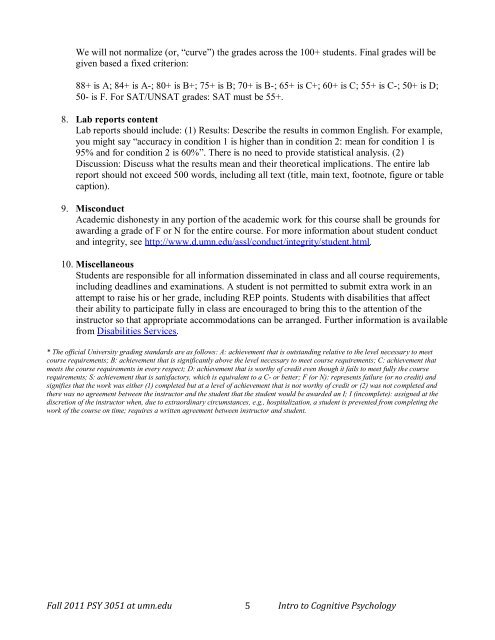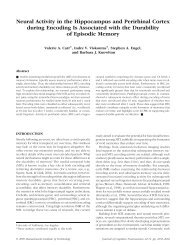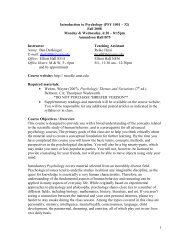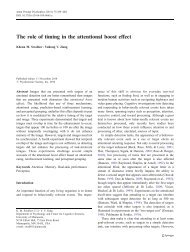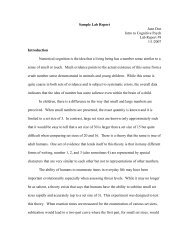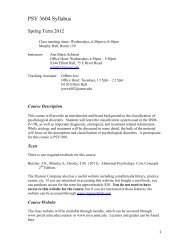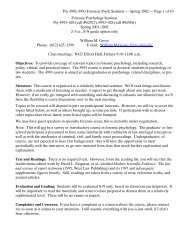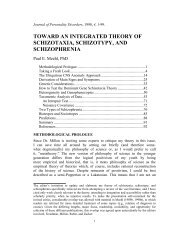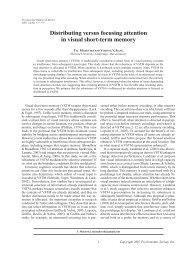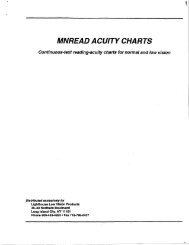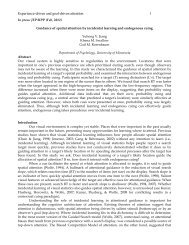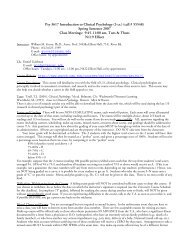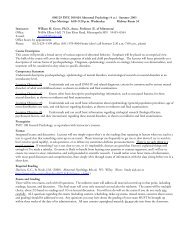PSY 3051: Introduction to Cognitive Psychology - University of ...
PSY 3051: Introduction to Cognitive Psychology - University of ...
PSY 3051: Introduction to Cognitive Psychology - University of ...
You also want an ePaper? Increase the reach of your titles
YUMPU automatically turns print PDFs into web optimized ePapers that Google loves.
We will not normalize (or, “curve”) the grades across the 100+ students. Final grades will begiven based a fixed criterion:88+ is A; 84+ is A-; 80+ is B+; 75+ is B; 70+ is B-; 65+ is C+; 60+ is C; 55+ is C-; 50+ is D;50- is F. For SAT/UNSAT grades: SAT must be 55+.8. Lab reports contentLab reports should include: (1) Results: Describe the results in common English. For example,you might say “accuracy in condition 1 is higher than in condition 2: mean for condition 1 is95% and for condition 2 is 60%”. There is no need <strong>to</strong> provide statistical analysis. (2)Discussion: Discuss what the results mean and their theoretical implications. The entire labreport should not exceed 500 words, including all text (title, main text, footnote, figure or tablecaption).9. MisconductAcademic dishonesty in any portion <strong>of</strong> the academic work for this course shall be grounds forawarding a grade <strong>of</strong> F or N for the entire course. For more information about student conductand integrity, see http://www.d.umn.edu/assl/conduct/integrity/student.html.10. MiscellaneousStudents are responsible for all information disseminated in class and all course requirements,including deadlines and examinations. A student is not permitted <strong>to</strong> submit extra work in anattempt <strong>to</strong> raise his or her grade, including REP points. Students with disabilities that affecttheir ability <strong>to</strong> participate fully in class are encouraged <strong>to</strong> bring this <strong>to</strong> the attention <strong>of</strong> theinstruc<strong>to</strong>r so that appropriate accommodations can be arranged. Further information is availablefrom Disabilities Services.* The <strong>of</strong>ficial <strong>University</strong> grading standards are as follows: A: achievement that is outstanding relative <strong>to</strong> the level necessary <strong>to</strong> meetcourse requirements; B: achievement that is significantly above the level necessary <strong>to</strong> meet course requirements; C: achievement thatmeets the course requirements in every respect; D: achievement that is worthy <strong>of</strong> credit even though it fails <strong>to</strong> meet fully the courserequirements; S: achievement that is satisfac<strong>to</strong>ry, which is equivalent <strong>to</strong> a C- or better; F (or N): represents failure (or no credit) andsignifies that the work was either (1) completed but at a level <strong>of</strong> achievement that is not worthy <strong>of</strong> credit or (2) was not completed andthere was no agreement between the instruc<strong>to</strong>r and the student that the student would be awarded an I; I (incomplete): assigned at thediscretion <strong>of</strong> the instruc<strong>to</strong>r when, due <strong>to</strong> extraordinary circumstances, e.g., hospitalization, a student is prevented from completing thework <strong>of</strong> the course on time; requires a written agreement between instruc<strong>to</strong>r and student.Fall 2011 <strong>PSY</strong> <strong>3051</strong> at umn.edu5Intro <strong>to</strong> <strong>Cognitive</strong> <strong>Psychology</strong>


